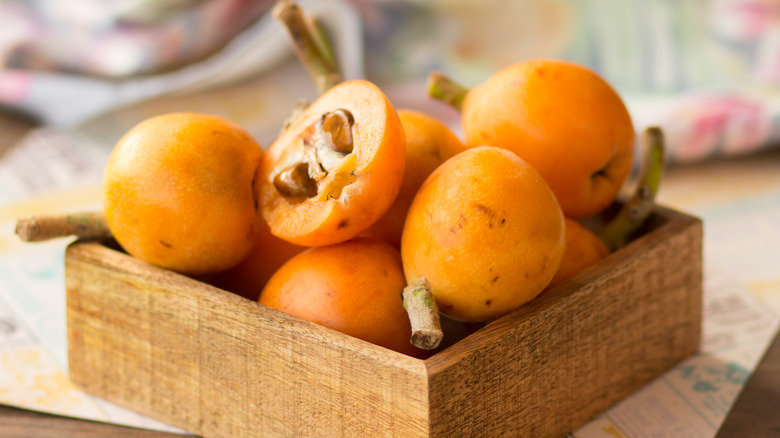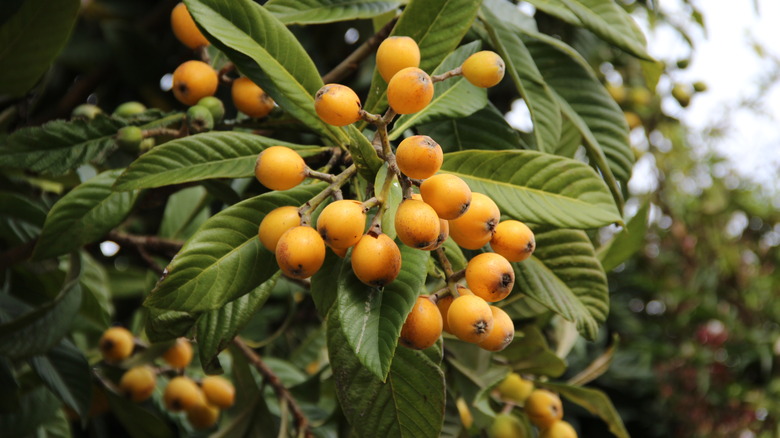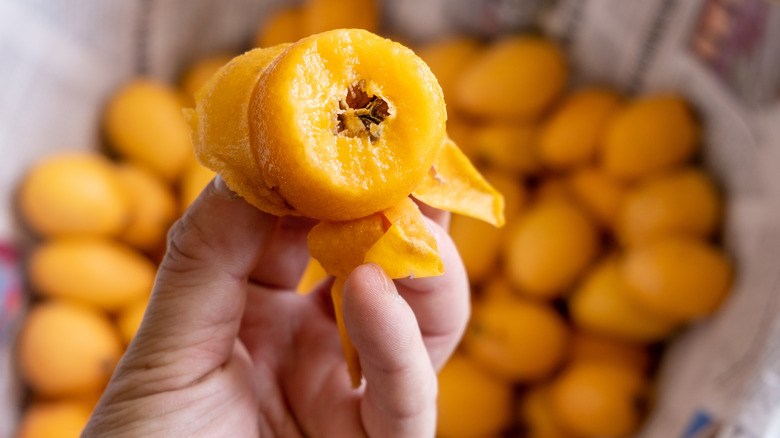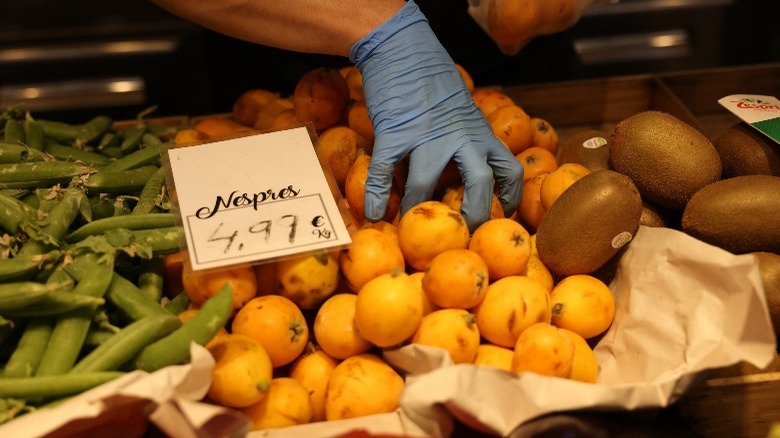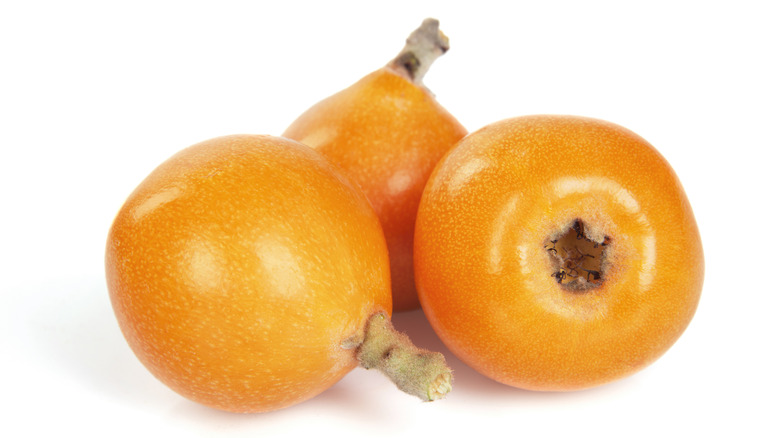The Loquat Is The Result Of A Spiteful Plant Exchange Between 16th-Century Kings
The loquat (Eriobotrya japonica) is a remarkable fruit that doesn't get the attention it deserves. This little gem packs a lot of flavor, and is thought to have originated in China and then been brought to Japan. This explains the epithet of the fruit's scientific name. Loquats are part of the Rosaceae family, which contains roughly 2,500 plant species, making them related to roses as well as other fruits such as apples, raspberries, and pears.
Though they're relatively uncommon in the U.S., loquats are worth checking out if you can find them. They come in a range of colors, from yellow to bronze to orange. While the fruits are small, the trees they grow on can be quite hardy and sizable, ranging from 9 to 33 feet in height. They thrive in warmer climates, like those suitable for oranges and other citrus. They can grow in cooler areas as well, however, they're less likely to produce fruit in colder temperatures. Loquat trees are prized for their versatility now, but they actually made their way to Europe from China as an intentionally unpleasant gift.
The history of loquats
The story about how the loquat tree made its way to Europe occurred during the age of exploration, and it serves as an example of how presents can be misunderstood. Portuguese explorer Jorge Álvares arrived in China in 1513 where, according to legend, he gave the emperor of China a rose bush, but the emperor didn't think much of the thorny plant that didn't have any blossoms at the time. Perhaps thinking one bad gift deserved another, he gave Álvares a loquat tree, known for its bitter fruit, to bring back to Portugal to give to the king. Of course, the rose bush eventually bloomed with gorgeous fragrant flowers. The legend continues to claim that once planted in Portuguese soil, the tree from China developed a new and delicious fruit.
Around this time Portugal developed trade with Asia. Portuguese traders brought back many things from China, including the loquat trees, which actually thrived in their new environment. The Portuguese call this fruit nêspera, and in nearby Spain, it is called níspero. Later, loquats were brought to other parts of the world. It is thought that Chinese immigrants helped establish loquat trees in the U.S. They brought these trees with them to Hawaii first and later to California during the late 19th century.
What does a loquat taste like?
This small fruit — usually only 1 to 3 inches long — has a pleasant tartness. Some think it tastes like an apricot and a peach combined. Others think it shares more of the flavor of such related stone fruits as cherries. The texture of loquat is similar to that of a pear.
There are several varieties of loquats, and the flavor of this fruit will differ somewhat depending on which ones you taste. The Big Jim loquat is known for being very sweet, while the Strawberry loquat lives up to its name, according to some growers. Gold Nugget loquats are said to have more of an apricot flavor. Vista White, a white flesh variety, is considered a great choice for sweet preparations because of its high level of sugar. Whichever variety you're lucky enough to get your hands on, make sure your loquats are ripe. Otherwise the fruit will be unpleasantly bitter and acidic.
How to cook with loquats
Many prefer to eat loquats fresh from the tree, either on their own or in a fruit salad. Some prefer to peel the fruit when eaten raw because its skin can be rough, depending on the variety. Always remove the seeds from loquats, however, because they aren't meant to be eaten. Loquats also taste delicious in chutneys, jams, and compotes. If you're feeling adventurous, you could work them into a barbecue sauce to add some sweetness along with a bit of a bite. Loquats are versatile; they can serve as a substitute in recipes that call for other stone fruits, like cherries and nectarines.
With their mild yet tangy flavor, loquats also rise to the occasion when added to such sweet treats as pies and pastries. Think loquat cheesecake or upside-down cake. And they can provide a new twist to classic drink recipes like margaritas and mojitos as well.
Where to buy loquats
Finding fresh loquats may prove to be a challenge. The delicate nature of these fruits makes it difficult to bring them to market unscathed. Unfortunately, this obstacle often deters farmers from trying to grow loquats on a large scale. Different varieties of loquats ripen at different times of the year, such as the Early Red which bares its fruit in February and the Advance varietal which reaches its peak in spring. Many of the loquats grown in the U.S. are from California, and they may be available at farmer's markets in that region.
If you're lucky enough to find loquats in other regions, it may be because they've been imported from Chile or Spain. Shopping online is another option as some specialty fruit companies do sell loquats directly to consumers. While they may be hard to find, loquats have an impressive shelf life. They can last for a couple weeks, even a month, in the refrigerator.
Nutritional information about loquats
The nutritional stats for loquats are pretty impressive. In a 1 cup serving, which only has 70 calories, you'll get an array of vitamins and minerals including 46% of your daily requirement for provitamin A carotenoids, per Healthline. The body converts this into vitamin A, which in turn supports your immune system, vision, and organ health. Furthermore, carotenoids offer anti-inflammatory and antioxidant benefits and they help in the fight against cancer and heart disease. Loquats also contain magnesium and potassium, two minerals that support heart function and help manage healthy blood pressure levels.
The leaves and fruit of the loquat have been used in Chinese medicine as a way to reduce inflammation, according to WebMD. It is the presence of triterpene acids that helps the body decrease inflammation levels. As mentioned above, beware of the fruit's seeds as they should not be eaten raw. A few cases of mild poisoning through loquat seeds have been reported.
